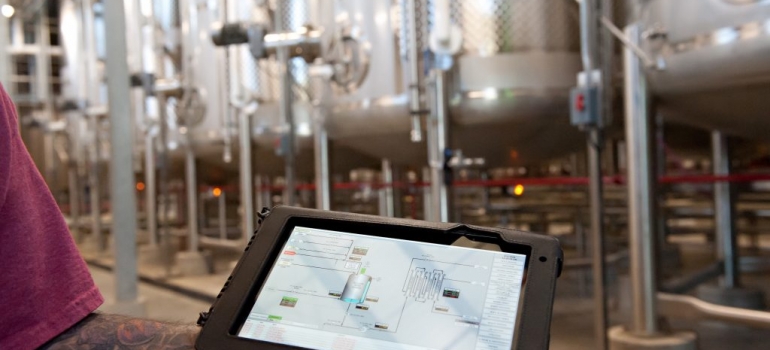
Takeaways:
-
- IoT isn’t just for the big guys
- It can help craft brewers and others focus on the more important stuff
- It can cut time and costs
Craft brewers wear a lot of different hats, but now they can hang a few of them on IoT.
Yes, the Internet of Things is “a thing” in beverage manufacturing, breweries, distilleries, and wineries.
And it’s not just for the big guys.
Even small craft brewers can tap into the more advanced automation, real-time monitoring, and predictive analytics of the large-scale IoT production plants.
“The big breweries were the first to really embrace IoT because of the cost, but now everything has been scaled down to the point that any size operation can afford to use them,” says ICC Controls Engineering Manager Jeremy McCormick. “That said, there has been a little bit of reluctance among craft brewers, who are very dedicated to the art of their craft.”
5 reasons to consider IoT for your craft brewery:
- Reduces use of on-site support staff for monitoring and troubleshooting
- Eliminates time-consuming staff training that cuts into production time and product quality
- Streamlines production processes for maximum output and quality
- Reduces losses from “bad” batches
- Reduces utility use and the overall facility footprint
IoT helps remove the guesswork
What IoT can do for craft brewers is automate the routine, mundane processes that eat up time and resources and literally keep them up at night, so they can concentrate on the unique alchemy that defines their brews while still getting product out the door.
Brewing and distilling, for example, are very dependent on temperature control. McCormick remembers one distiller describing his method for deciding whether they’d reached the right temperature: “He said, ‘you put your hand on the pipe and when you can’t keep it there anymore, pinch off the valve,’” says McCormick. “Obviously, this was not only a quality control concern, but a safety hazard as well.”
ICC’s design-build for the greenfield distillery eliminated that “hands-on” temperature control approach, while delivering a lot of other improvements in an expanded and modernized facility.
Everything from entire control systems down to a single-process device (i.e., flow meter, motor, valve, etc.) can be completely interconnected. Because it’s all connected and online, process optimization engineers can access real-time process key performance indicators that allow them to streamline the process.
Right-sizing a production facility is key.LEARN ABOUT ICC’S “FIT-FOR-PURPOSE” FOCUS.
This data can even be brought into predictive analytics to allow a control system to learn to optimize its own processes. “For example, typically a brewer can set up a fermentation batch to run at a set time and a certain temperature. Since fermentation occurs at different rates from one batch to the next, sensors in the system can alert operations managers if a batch is done earlier or will need more time than expected,” says McCormick. “The result is a more consistent product from batch to batch, along with more efficient production.”
Brewers can also get data analytics from individual batch reports, giving them feedback that can help brew masters improve or create new recipes.
ICC is an engineering and design partner you can trust to create visionary, compliant, and cost-efficient solutions. Click here to learn more.
No matter where you go, there you are
One of the best parts of the internet age is the real-time visibility that can be accessed at any time from a smart device. Using IoT, a craft brewer can manage equipment and processes without having to be onsite at all times to manually monitor and control temperatures and flows.
It’s not as complicated or expensive as it sounds. IoT sensors for temperature, flow monitoring, and other crucial functions can be added easily to most existing infrastructure without significant alterations.
Even better, a good partner like ICC can help with not only the technical stuff, but also the strategic.
“We begin with a design brief for every client, taking time to get to know their business in depth, talking to everyone but the engineers,” says ICC Turnkey President Alex Alexandrov. “Engineers tend to design for every eventuality, which is great, but it’s also very expensive. We reduce costs by really tailoring our design to the client’s needs.”





